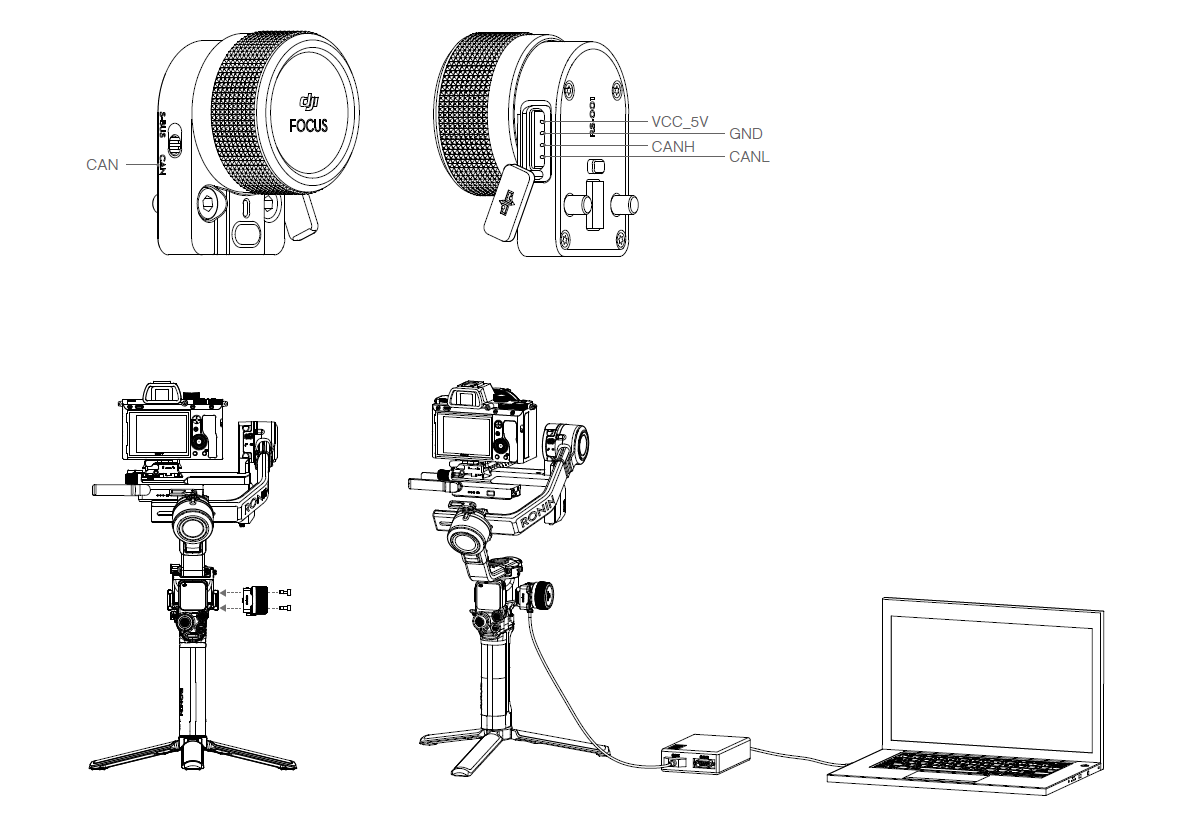The DJIR Software Development Kit is developed based on DJI RS 2 and DJI R SDK protocol v2.2. By using this SDK and connected via USBCAN-II C (by Shenyang Guangcheng Technology Co.,Ltd), users can control the handheld gimbal device movement and obtain its partial information.
Below shows how DJI RS 2 connects to a PC via the CAN converter:
For developers who want to download DJIR SDK from source using the Git-client, follow these instructions:
- On Linux, use the terminal command:
sudo apt install git - On MacOS, use the terminal command:
brew install git - For other platforms see git installation documentation.
- On Linux, click on the launchpad and look for «terminal»
terminal - In OS X, press commandspace and find «terminal»
terminal - On Windows, click the Start menu and find the «command line»
cmd.
git clone https://github.com/ConstantRobotics/DJIR_SDK.git
cd DJIR_SDK
git submodule update --init --recursiveWe recommend to use a git client for downloading and Qt Creator for project building
The DJIR_SDK contains a description of just one class DJIRonin with simple interface for easy use:
class DJIRonin
{
public:
DJIRonin();
~DJIRonin();
/**
* @brief connect - Connect to DJI Ronin device
* @return True if success
*/
bool connect();
/**
* @brief disconnect - Disconnect from DJI Ronin device
* @return True if success
*/
bool disconnect();
/**
* @brief move_to - Handheld Gimbal Position Control (p.5, 2.3.4.1)
* @param yaw Yaw angle, unit: 0.1° (range: -1800 to +1800)
* @param roll Roll angle, unit: 0.1° (range: -1800 to +1800)
* @param pitch Pitch angle, unit: 0.1° (range: -1800 to +1800)
* @param time_ms Command execution speed, unit: ms. Min value is 100ms.
* Time is used to set motion speed when gimbal is executing this command.
* @return True if success
*/
bool move_to(int16_t yaw, int16_t roll, int16_t pitch, uint16_t time_ms);
/**
* @brief set_speed - Handheld Gimbal Speed Control (p.6, 2.3.4.2)
* @param yaw Unit: 0.1°/s (range: 0°/s to 360°/s)
* @param roll Unit: 0.1°/s (range: 0°/s to 360°/s)
* @param pitch Unit: 0.1°/s (range: 0°/s to 360°/s)
* @return True if success
*/
bool set_speed(uint16_t yaw, uint16_t roll, uint16_t pitch);
/**
* @brief get_current_position - Get Gimbal Information (p.6, 2.3.4.3)
* @param yaw Yaw axis angle (unit: 0.1°)
* @param roll Roll axis angle (unit: 0.1°)
* @param pitch Pitch axis angle (unit: 0.1°)
* @return True if success
*/
bool get_current_position(int16_t& yaw, int16_t& roll, int16_t& pitch);
// Etc...Create a new project in Qt Creator by CMake with using SDK-sources
- Open File > New File or Project, select Qt Console Application and click Choose button
- Enter project name, Browse project location and click Next button
- Choose CMake build system and click Next button twice
- Select one of 64bit compilers (MinGW, MSVC, Clang, etc..), click Next button and finish project setup.
- Download the project:
git clone https://github.com/ConstantRobotics/DJIR_SDK.git
cd DJIR_SDK
git submodule update --init --recursive- Modify your CMakeLists.txt file according to the example below and update DJIR_SDK_DIR according to your path to DJIR_SDK folder:
cmake_minimum_required(VERSION 3.13)
###############################################################################
## EXECUTABLE-PROJECT
## name and version
###############################################################################
project(DJIR_Example LANGUAGES CXX)
###############################################################################
## SETTINGS
## basic project settings before use
###############################################################################
set(CMAKE_INCLUDE_CURRENT_DIR ON)
set(CMAKE_CXX_STANDARD 11)
set(CMAKE_CXX_STANDARD_REQUIRED ON)
# creating output directory architecture in accordance with GNU guidelines
set(BINARY_DIR "${CMAKE_BINARY_DIR}")
set(CMAKE_RUNTIME_OUTPUT_DIRECTORY "${BINARY_DIR}/bin")
set(CMAKE_LIBRARY_OUTPUT_DIRECTORY "${BINARY_DIR}/lib")
###############################################################################
## TARGET
## create target and add include path
###############################################################################
# create glob files for *.h, *.cpp
file (GLOB H_FILES ${CMAKE_CURRENT_SOURCE_DIR}/*.h)
file (GLOB CPP_FILES ${CMAKE_CURRENT_SOURCE_DIR}/*.cpp)
# concatenate the results (glob files) to variable
set (SOURCES ${CPP_FILES} ${H_FILES})
# create executable from src
add_executable(${PROJECT_NAME} ${SOURCES})
###############################################################################
## INCLUDING SUBDIRECTORIES AND LINK LIBRARIES
## linking all dependencies
###############################################################################
# set DJIR_SDK path variable
set(DJIR_SDK_DIR "../DJIR_SDK")
# add subdirectory of DJIR_SDK
add_subdirectory(${DJIR_SDK_DIR} DJIR_SDK)
target_link_libraries(${PROJECT_NAME} DJIR_SDK)- Modify your main.cpp file according to the example below:
#include <string>
#include <iostream>
#include "DJIR_SDK.h"
using namespace DJIR_SDK;
int main(void)
{
std::cout << "###########################################" << std::endl;
std::cout << "# #" << std::endl;
std::cout << "# DJIR-SDK Test v1.0.0 #" << std::endl;
std::cout << "# #" << std::endl;
std::cout << "###########################################" << std::endl;
DJIRonin gimbal = DJIRonin();
// Connect to DJI Ronin Gimbal
gimbal.connect();
// Select ABSOLUTE_CONTROL mode
gimbal.set_move_mode(MoveMode::ABSOLUTE_CONTROL);
// Move to center position (yaw = 0, roll = 0, pitch = 0) for 2000ms
gimbal.move_to(0, 0, 0, 2000);
int16_t yaw = 0;
int16_t roll = 0;
int16_t pitch = 0;
gimbal.get_current_position(yaw, roll, pitch);
std::cout <<"yaw = "<<yaw<<" roll = "<<roll<<" pitch = "<<pitch<<std::endl;
std::cout << "Press any key to continie...";
getchar();
return 1;
}- Select Debug or Release build type, Run CMake and Run project

